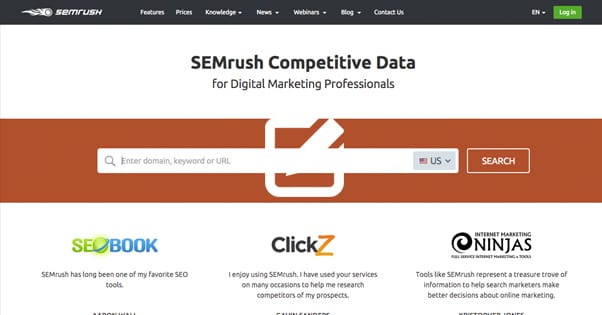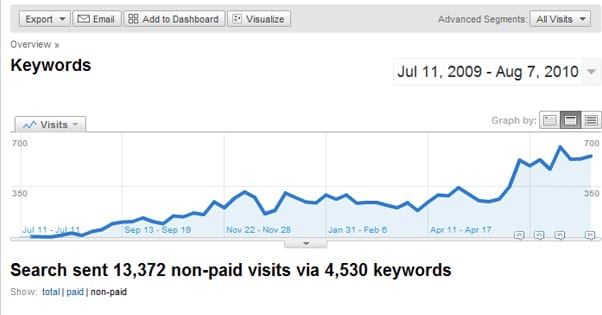What Kind of Content Should You Write on a Business Blog?
Published by James Parsons • Content Marketing • Posted December 16, 2015 ContentPowered.com
ContentPowered.com
There are thousands of blog posts written about why you, as a business owner, need a blog for your business. There’s a huge amount of information about why you need one, how to set one up, how to run one, how to grow one, and all the rest. There’s just one problem; what do you write?
The problem with running a blog as a business owner is one of perspective. You tend to know a lot about your business. It’s what you do, it’s what you’re passionate about. With that perspective, you have a hard time figuring out what your potential readers might want to know. Are there simple questions you gloss over because, to you, it’s fundamental, basic understanding? Are there complex concepts that you feel are above the heads of your readers, when really they would be quite interested to read about them?
Then you have the idea of competition. The Internet is very new in terms of human history, but it’s quite old in terms of content production. There are hundreds of millions of blogs out there, with varying levels of activity and content production, coming and going all the time. Add to that all of the resource sites, all of the instructional sites, and all of the non-blog content production houses and you have an insane amount of content. It’s hard to start a blog when you face such an overwhelming amount of existing content. The drive to be new, to be original, is strong among business owners. Starting a blog when everything you could want to cover has already been covered? It seems like a futile exercise.
The trick to passing that issue is to just assume you’re superior to everyone else, even if you’re not. Assume all the rest of the content out there is terrible and that you can do better. In fact, take it one step further; identify the content that exists and intentionally work to do it better. There, one content idea. That one’s free. The rest… will also be free, actually, starting now.
Do Them One Better
To elaborate on the first idea, there’s nothing wrong with using the competition for inspiration. Identify what content is popular and high quality in your industry, then cover those topics yourself, with as much detail and quality as you can muster. Do what they did, and do it better. Dig deeper into details, give more statistical analysis, put your own unique perspective into it. Higher quality content can work to supplant the competition and put you in a better place.
Now, you won’t be able to succeed doing just that. For one thing, making yourself a spun copy of a more popular blog is a transparent strategy that won’t get you much of anywhere. For another, these established sites have more links, content, and SEO than you do, so you’re starting at a disadvantage. No, you’ll need to be picky about the content you one-up on their sites. Pick the best content from numerous sites and do it better, but supplement it with your own content. So, what other kinds of content can you write?
Lessons From Perspective
This type of content is all about spinning pithy every day occurrences into reasonable lessons for your readers. Do you take the bus to work? Listen to the people around you and take something they said as inspiration to spin off into a high-concept instructional post. Have you attended a conference or industry event? Write about your experiences there and what you learned, who you met, and what insight you have gained. Hear a song frequently on the radio? See if you can find a way to spin the lyrics into something relevant to your industry.
It helps if you have a tablet with a writing app up and ready to go, or at least have a small notebook and pencil you can carry around with you to jot down notes whenever inspiration strikes. I prefer the notebook, because technology is full of its own distractions. When you spend your time looking outwards rather than staring inwards, you see more of the world around you and can spend more time thinking about how it applies to your life and your business.
FAQs
Image credit: NerdBlock.com
If you run a business, you have customers. If you have customers, you have people coming to you with questions. If you have more than one customer, chances are you’ve heard a few of the same questions over and over and over again.
Write down these questions, and then write a detailed blog post covering the issue from the ground up. Explain the issue, explain how to solve it, and if you can, dig into the details of why it happens. The simple fix up front helps out the people just looking for the answer, and the technical details help developers or more technical users later, who prefer understanding over hotfixing.
Histories and Profiles of Team Members
Who are you? Who do you have working for you? Why should anyone trust what you and your team have to say? Figure it out, and tell your stories. Now, people don’t really care that Bob from HR has three kids and went to Middleville High; they care that he has 15 years of experience with your industry and has valuable opinions to share. The personal details are just fluff that make him a person beyond just some statistics and knowledge.
The Story of the Company
Why did you found your company? What need drove you to this place? How have you reached the position you have reached? By telling the origin story of your company, you can get people on your side. They support you, because they sympathize or recognize something important in what you have to say and where you came from. Of course, this works best if you have a long history with an old company, but even new companies can benefit from telling their origin stories when they’re fulfilling a need.
Interview Other Influencers
I love interviews because they give value both ways. There’s a certain amount of credit and authority that comes with an interview. If someone is interviewing you, you must be important, right? No one just goes and interviews some random guy off the street unless they were a witness to a shooting or they’re an important minority for a political piece. Meanwhile, if you’re doing an interview, you must have some authority; after all, who would grant an interview to someone with no authority?
Plus, of course, interviews can give a lot of valuable content, insight, and opinions from another important figure in your industry.
Write Detailed Tutorials
A good tutorial for something related to your industry or your product can go a long way, both towards making you an authority, and towards saving you time. Instead of answering questions directly, you can direct users to the tutorial page. There’s a lot that goes into a good tutorial, though, so make sure you write it right.
Note that you don’t necessarily need to write only tutorials about your own products. You can write about how to migrate from a competitor product, how to use a supplemental product with yours, or even something barely even related to your own products.
Discuss Business Successes
One thing you see on a lot of popular business blogs is a discussion or study of what they have done recently that was successful. One common example is ad campaigns. Run a successful ad campaign, and then dissect it in a public case study. Show others in your industry what you did to be a success, so that they can follow in your footsteps and grow to a success as well. Don’t worry; there’s room enough for everyone.
Discuss Business Failures
Almost more useful to you and to your industry than your successes are your failures. They give you a lot of fodder for an insightful case study and post, explaining what you did, what you thought it would do for you, and what it actually did. By looking at it with an introspective and unbiased eye, you can figure out where it all went wrong. This is helpful to your readers so they can know to avoid the same mistakes. It’s also helpful to you, so you can avoid them going forward.
Analyze Recent Site or Business Data
Statistics aren’t the most attractive topics in the world, but they can be very useful for blogging. Why? By analyzing statistics, both for your own business and for your industry as a whole, you can become a cited source for everyone. When you publish a study that produces up to date statistics, you’re opening the door for a ton of links to that content, as everyone else uses and cites those statistics.
Acquiring a lot of links is the best way to grow, so producing content that is widely cited is excellent for this. Plus, if a given survey can be repeated on a broader scale, you have ample opportunity to leverage the previous survey into it. Expand it each year and turn it into an annual growth opportunity.
Coverage of Industry News
There are two broad categories of content online. The first is evergreen, and that’s what a lot of the above is all about. Evergreen content doesn’t go out of style. It’s like a tutorial; it can be useful for as long as the product it references exists. Someone, somewhere, still uses that product and will be happy to find the tutorial.
The other type is timely, and that’s what you would label news sites and trend watchers. This content is rarely valuable for more than a week, but it can be very useful when it’s created. Think of evergreen as a road flare, designed to last a while, while timely content is like a firework; explosive for a short time.
Reviews of Supplemental Products
You can review other products in your industry, either that work with your products or are competing products. There’s no reason to shy away from reviewing a competitor, and you can even give them a high rating; just make sure to point out what you do that they don’t, and where you’re better.
The typical product review will start off with an introduction of the product and the company making it, followed by the pros and cons, what you like and what you don’t like. You can then provide a recommendation and, if the product is something that works with your product, a call to action to buy both.
Event or Sale Announcements
General advice is that most of your blog should not be about direct marketing. Very few people care enough about your brand or your product to read a blog that’s all “my product is great” and “you should buy this widget” over and over. Instead, most of your blog should be more generally useful, helpful, and informative content.
That said, there’s no reason not to include some more brand-specific posts from time to time. Nothing says you can’t promote a new product, a new revision for a product, a new service, or an event you’re hosting or sponsoring. After all, you are a business, and you are in it to earn more business. It’d almost be confusing to find a blog that didn’t promote its business.
Industry Content Top Lists
There’s a lot of good content out there in your industry, and all of the other blogs are trying to produce more just as much as you are. Rather than try to one-up all of them a week behind, why not curate some of the best value? Don’t limit yourself to being a resource just based on your own content. Turn yourself into the place to go if someone wants to see everything going on in your industry. Follow the other major blogs and write weekly or monthly recaps of what they produced, what content you liked, and what content seems to be doing the best.
Guest Posts
Again, you’re not alone in your industry. While a lot of bloggers are shying away from guest posting, it’s still a valid and legitimate strategy when it comes to building a blog. The only caveat is you have to be careful not to just accept random guest posts with links to sites you don’t like. Those kinds of guest posts are the kinds that get a side penalized.
Normal guest posts – that is, valuable posts from other good industry bloggers – are great to have round. They give you a lot of high quality content that you didn’t have to personally write, and even if they give credit to an author on another site, at the end of the day the content is on your site and you get the most value from it.
Book Reviews
Unless you’re in an industry that you created and that no one else has ever thought up before, there are going to be other people writing in it. Chances are, some of those people have written books, either real physical books or ebooks they sell or give away online.
As an added bit of value to your blog, you can write reviews of those ebooks. It costs you nothing to leave a favorable review if you like it, you just earn the good will of the writer of the book, who is more likely to link back to you or favorably review a book you publish in the future.
Lists of Anything
Pick a keyword. I don’t care what it is, it hardly even matters. Let’s use Blue Widgets as an example. Now pick a number. Want more detail, pick a smaller number. Want less detail but more quantity, pick a higher number. Let’s go with 23.
Boom. The Top 23 Blue Widgets to Buy in 2015. 23 Secrets to Success Using Blue Widgets. 23 Ways Blue Widgets have Helped CEOs Grow. Lists are easy to churn out. That’s why Buzzfeed and Cracked are so popular,.
Industry Resource Pages
This is an extension of the weekly or monthly roundups I posted above, but take it one step further. It’s less about blog posts, though you can post them to your blog. Just keep them updated.
The idea is to make a comprehensive guide to every industry resource you can find of any real value. Just make one giant list with descriptions. Categorize them as much as possible, so that anyone browsing can easily find the sorts of resources they’re looking for. Then just make the post as comprehensive as you can and strive to keep it updated.
I recommend updating it about once a month. Throughout the month, keep an eye on the high quality blogs and the resource posts they publish. Note them down, but don’t bother taking the time to update your master post right away. Take the time to do it all at once later, so you’re not constantly making edits.
Refresh Old Content
At this point, you probably have a lot of content, and a lot of the older content is going out of date or out of style. Why not cover the same topics again, with a more knowledgeable perspective, with more information on hand, and with new changes, rules, and products in mind? You can’t refresh every piece of content and make it valuable, but you can certainly bring a lot of it back to life.
















